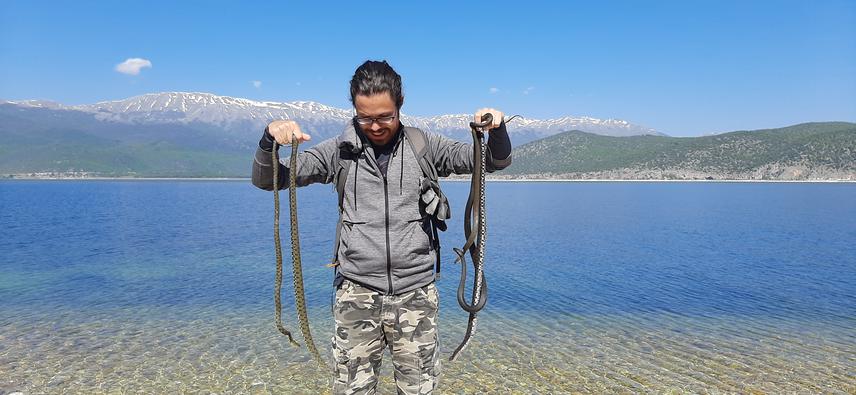Vukašin Bjelica
Golem Grad island is a strictly protected area within National Park Galičica (North Macedonia). It is better known as “Snake Island”, due to the large population of dice snakes inhabiting the 20ha large island. The island’s conservation experienced a breaking point in 2008 when long-term capture-recapture studies were initiated on three reptile species, and simultaneously this biologically and culturally attractive sight became open to tourists. Unfortunately, in 2011 our data revealed a dramatic and ongoing drop-in capture rates of dice snakes. Primarily, we suspect this is linked to the increase of poaching activities near the island, which traps the snakes in fishing nets, leaving them to drown. There is also a high number of unsanctioned tour rides which may also have harmful effects on the island.

Tourists arrive mostly via uncontrolled boat rides from locals, although organized boat rides and tours do exist. Unfortunately, neither limits the duration of the visits, nor do they keep the tourists from roaming freely. All of this points to the lack of active measures that need to be undertaken in order to stem the negative effects of unsanctioned tourism and poaching and prompts an urgent reevaluation of current conservation measures.
We plan on:
1. Estimating the exact ramification of present threats and the way they impact the island
2. Evaluating the dice snake population state as a means to estimate the effects of illegal fishing
3. Prompting a reevaluation of current conservation measures and tourist protocols – The data we will acquire during this project will be presented to the National Park officials/rangers and will prompt a revision of current conservation measures and reconsideration of protocols regarding tourist activity.
4. Engaging biology students during field efforts - This has been proven useful as it facilitates data collection, makes efforts sustainable as these students eventually take up conservation challenges on their own.
5. Expanding educational efforts among the local populace – Although limited educational efforts were done before there is still potential to expand these to local fishermen
6. Developing conversations with park rangers and tourist organizations -Maintaining and further developing conversations with park rangers will enable us to find more efficient ways in sanctioning poaching activities along with reconsidering the current protocol for boat rides and tours of the island. We will also hold discussions with tour guides on how to properly conduct tours to the island minimizing the harmful effects to biodiversity.